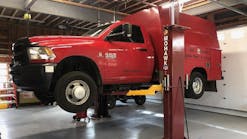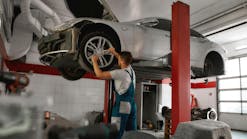Poison Prevention Week: Hidden toxins in the automotive industry
National Poison Prevention Week (observed this year March 18-24) typically conjures images of small children and household products making a potentially fatal combination. However, this week of awareness is an opportune time to call attention to the various toxins we may unknowingly come into contact with on a daily basis and can severely impact our health. Poisoning is a primary cause of injury-related death in the United States, so this is no small or isolated issue.
The week was established by President John F. Kennedy in 1962 in collaboration with Congress. Each year since, the National Poison Prevention Week Council takes strides to raise awareness about the dangers poison presents and works toward better regulation of these substances. The potential for poison exposure lies in a variety of settings and occupations, including the automotive industry. Besides the typical diesel and paint fumes, there are a number of lesser known chemicals mechanics and automotive professionals come into contact with regularly.
Solvents
Solvents are used in a variety of settings during vehicle repair. From windshield wiper fluids, lubrication and degreasing solutions, to an additive material in plastics, paints and adhesives, no garage is short of solvents. With that, solvents are some of the most commonly used chemicals in the US.
Solvents boil down to chemical compounds like benzene, chloroform and perchloroethylene. With continual or excessive exposure, these chemicals can lead to a host of health complications, including liver and kidney failure, nervous system damage, respiratory problems, dermatitis or lesions and cancer. These most often occur after inhaling solvent fumes or experiencing on-skin contact.
Asbestos
As a naturally occurring mineral, asbestos was widely used in the U.S. from the 1930s through the late 1970s. Valued as a fire-resistant material, it saw a great deal of use in vehicle materials and parts. Traces of asbestos have been found in brake components such as brake pads and lining, as well as clutch lining, transmission plates, hood liners, gaskets and heat seals.
Tampering with asbestos-containing materials produces fibers that can be breathed in or ingested and harmfully impact your health. In serious cases, asbestos causes irritation in the body and leads to severe conditions like asbestosis and some forms of lung cancer, such as mesothelioma.
Mercury
Mercury has its own history in vehicle production. The toxic material has historically been used in lighting switches, antilock brake systems and mercury carburetor synchronizers. With mercury in the workspace, if handled improperly there is potential for spilling or inhaling the substance through car exhaust.
The impact of mercury exposure can be felt twofold. Mercury poses a threat to the environment when the vehicle is disposed of or broken down, allowing the substance to seep into local bodies of water and effect the ecosystem. Direct exposure in the workplace can be just as severe, with direct ties to damage and failure of the lungs, kidneys and nervous system.
Lead
Lead has a storied reputation in the scope of Poison Prevention Week, but many people may not know the heavy metal also has a place in the automotive repair industry. In addition to some paints and lubricants used, the substance can also be found in vehicle radiators and batteries. According to the World Health Organization, lead has been identified as 1 of 10 chemicals that are main public health concerns.
In the automotive industry, the effects of lead exposure are often felt after inhaling lead particles. A significant amount of these particles remain dormant in the lungs for many years. The early stages of exposure are often hard to diagnose, as they coincide with similar symptoms of other conditions, including muscle pain, nausea, loss of appetite and depression. When the exposure is continual or chronic, these symptoms may increase in severity and impact neurological, muscle and gastrological function.
Manganese
A naturally occurring element, manganese is a silvery substance that has been tied to health complications for decades. Manganese is often used in steel production and is a common component of electric car batteries, as well as an additive in gasoline used to improve octane ratings.
While fairly common and healthy to come into contact with in moderation, continuous exposure to manganese in exhaust fumes can lead to health complications. Some of these symptoms include slower motor skills and coordination, nervous system trouble, and psychological issues or hallucinations. Workers in the steel industry found themselves experiencing this so frequently that it was diagnosed as ‘manganism.’
It’s important to be aware of the dangers each of these toxins pose, their potential presence in the workplace and how to be prepared in the case of exposure. The easiest precaution to take is to always wear protective gear while working, including gloves, breathing masks and safe attire. Accidents and spills are inevitable, but handling them with caution is the best way to protect your health and the health of those around you. Poison Prevention Week serves as a reminder that common materials and things we come into contact with every day can contain toxins. With a greater awareness and the proper precautions in place, automotive professionals will be in the best position to continue their work for many years, while encouraging healthier, more sustainable solutions in the industry.
Information provided by: the Mesothelioma Cancer Alliance


